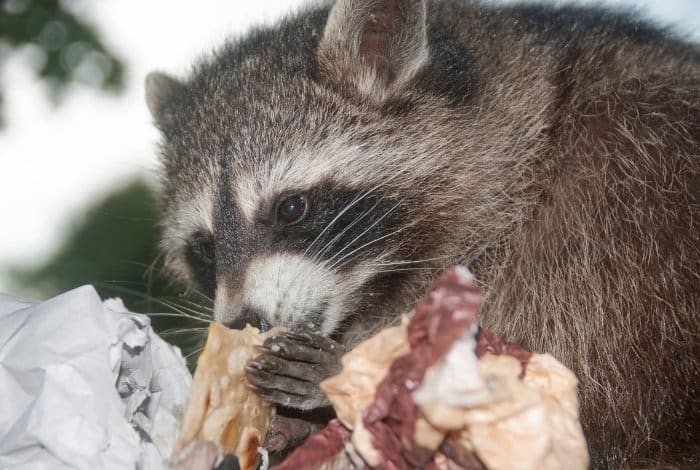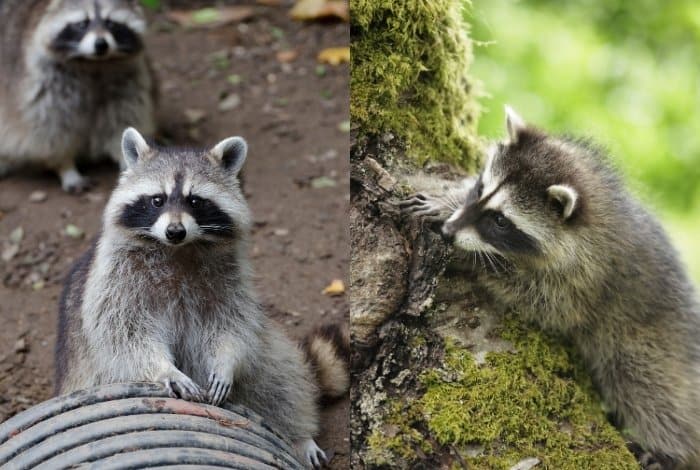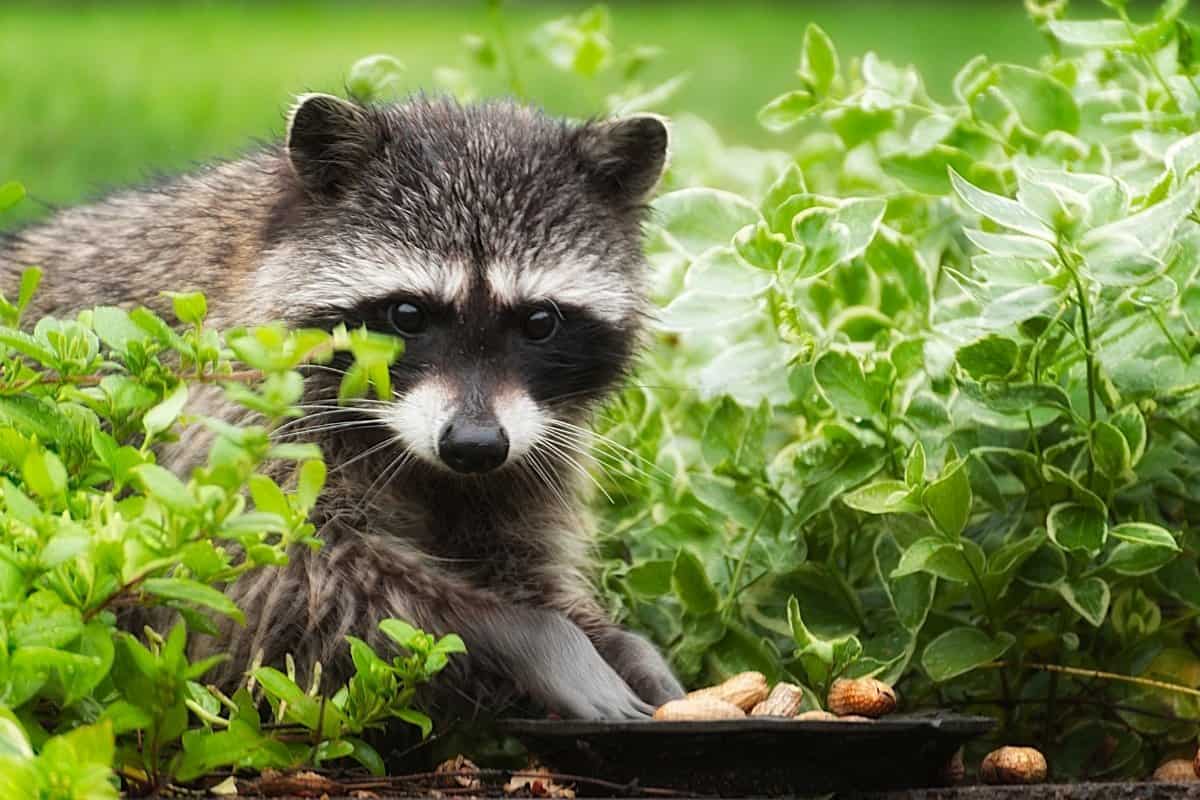Last Updated on January 14, 2022 by
What do raccoons eat exactly since we only know them as little thieves that stalk through the neighborhood looking for their next meal?
Raccoons are highly intelligent and curious little creatures. But they can also be a great nuisance to any homeowner. These nocturnal mammals can destroy your garden in a day; tip your garbage cans over in search of food.
Scavenging the remains of human food is one facet of their diet, which one is the other?
What Do Raccoons Eat?
Raccoon’s diet is variable depending on the circumstances. These creatures are opportunistic scavengers that will eat just about anything. They are omnivorous meaning they eat both plants and meat. The majority of their food is made up of invertebrates and plants. They have their favorite foods just like most animals but generally, they will eat whatever is available to them. Raccoons are highly adaptable species having dramatically different food sources depending on their location and time of the year.

Common Foods That Raccoons Eat
Here are some common foods that raccoons like to eat:
- Small rodents
- Frogs and other animals
- Fruit
- Eggs
- Seeds
- Insects
- Nuts
- Crayfish
- Snakes
This list can be added on depending on where the raccoon lives and what they can easily find there.
Raccoons Easily Adapt To Their Environment
It is difficult to answer the question of what do raccoons eat specifically because they eat different things in different environments and times of the year.
These creatures take whatever they can easily get effortlessly and turn it into their food. That’s why raccoons don’t mind rifling through your trash bins
Raccoons were not meant to live on leftover; they were designed to use their paws to fend for themselves from the surrounding environment.
They have paws like humans that can open latches, garbage cans with ease. Their paws are great at inspecting whatever food they find and removing any pieces, they don’t want to eat.
They have teeth capable of tearing plants and meat alike similar to the human’s tooth structure with canines, incisors, and molars.
When you put together these characteristics, you understand that a raccoon is a highly intelligent and adaptable animal with rich and diverse food gathering habits.
Do Raccoons Hunt For Their Food?
Raccoons find easy food sources. Hunting is not necessary where they can find easy food. But under the right conditions raccoons can be highly effective hunters.
They commonly hunt for small rodents like mice or squirrels, frogs, snakes, and insects. They are also known to seize the opportunity to steal eggs or hatchlings from birds’ nests.
Raccoons are also good fishermen! They like to wait close to the water and regularly catch a small fish to enjoy. Crayfish and mollusks are a few favorites fish they like to pick on. They love to hunt in wet environments because of the abundance of prey.

All this depends on the availability of food because they focus their attention on whatever food is easy to get. They may hunt more when frogs and fish are in plenty but when the supply goes low they move on to other food types.
In short, they only hunt when the opportunity arises and mix their diet with other things like fruits berries, and nuts.
Check out How to Get Rid of Voles
What Do Raccoons Eat During Winter?
Seasons leading up to winter, raccoons eat as much as possible to store body fat for the cold months to come. Their body fat is stored in their tail which they will wrap around their body to keep them warm during the cold season.
Raccoons lose a lot of body weight during winter; anywhere between 14% to 50% of their body weight. They spend most of their time in the dens in order to stay warm. They may even get into hibernation-like sleep called torpor for several weeks. During the harsh winter months, they will most likely eat corn, insects, nuts, and small animals they find.
Once the winter lifts, they venture out for food and the ability to eat anything they come across is a huge advantage. Raccoons living in warmer areas do not have to worry about the winter. They won’t have as much trouble finding food to eat.
Read about How to Keep Deer Out of Your Garden? Best Natural Deer Repellents
Conclusion
Raccoons take feeding to a whole new level. They eat anything they can easily get hold of. These crafty animals will do anything to survive even if it means eating straight out of the garbage can. They are also mischievous so you must be prepared to keep them off as best as you can.
While they are cute, feeding them only encourages them to come out in large numbers to your home for more food. You are discouraged from leaving food for them at night because this will only encourage their growth and ravaging. If you notice raccoons ravaging your garbage, do your best to secure the cans to prevent them from eating from them. Also, you can report to the wildlife society near you to get them trapped and picked.
FAQs
What is a raccoons favorite thing to eat?
It's very hard to tell, since there are so many different kinds of raccoons. There are probably two things that they would like to eat: The fruit of the fruit tree. Raccoons will eat most kinds of fruit, but they especially like melons and watermelon. They will also eat apples, peaches, pears, and plums. Dead rodents.
Raccoons will eat dead rodents. They will also eat carrion, which is the carcass of a dead animal. They will eat eggs from nests and birds. They will eat fish. Raccoons are omnivores, meaning that they will eat meat as well as fruits, vegetables, nuts, seeds, fungi, and insects.
Are raccoons bad to have around?
Yes, raccoons can be very destructive. They can chew through your fence and dig up your lawn. If they get in your house they will destroy all of your belongings, including your food. You might also find raccoons in the trash, or on your porch, digging up your garbage cans. The best way to keep them away is to use a trap. This is a humane way to catch them.
What can raccoons not eat?
The biggest problem that raccoons have with eating things is that they can’t chew them very well. Raccoons chew by using a set of teeth that are designed for crushing nuts, seeds, and berries.
They don’t have the jaw strength to chew solid food like meat or bread. To solve this problem, raccoons evolved to be able to swallow the food whole and let it dissolve in their stomachs.
This allows them to eat almost anything. Raccoons can also hold onto their food for a long time. They can keep it for up to 3 days. This helps them store fat to make sure they are full even if they haven’t eaten.
What do raccoons hate?
I've seen it said that raccoons hate "the sight of blood." There's a book called "The raccoon diet" by Paul L. Jones (published by Houghton Mifflin in 1974., which describes in detail the raccoon's diet and also gives lots of interesting information about raccoons in general.
What should I do if I see a raccoon in my yard?
Raccoons can be quite destructive when they raid your trash cans. They will gnaw and rip open trash bags, rip up plastic bags and they are very fond of tearing apart anything they can get their teeth into. If you have a trash can, the best thing to do is make sure it is not accessible to them and that there are no openings large enough for them to squeeze through.
We have used our air purifier in the past to remove raccoons from homes. The air purifier should be set to run continuously and should be placed on high. Raccoons are attracted to the sound of running water and should be driven out of your home with the purifier running.
Caroline is a gardener who loves to get down to the nitty–gritty of gardening. She proudly proclaims herself as a ‘dirt worshipper‘ and can often be found deep in the garden, covered in soil and singing to her plants. As a self–proclaimed ‘plant whisperer‘, Caroline believes that plants need love and attention just like any other living thing, and she loves to give them both. When she‘s not tending to her garden, you can often find her researching the latest gardening trends, or teaching others how to make their gardens thrive



